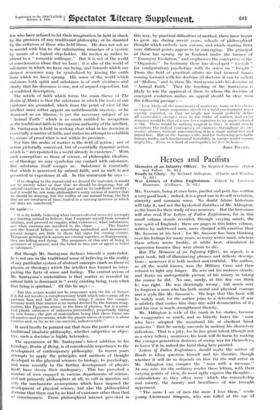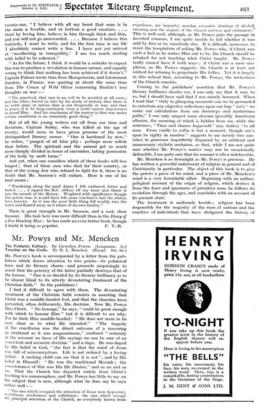Heroes and Pacifists
War Letters of Fallen Englishmen. Edited by Laurence Housman. (Collanez. 7s. 6d.) Ma. Sassocor, being at once hero, pacifist and poet, has written a very good book ; indeed, it is a great one in its self-revelation, sincerity and common sense. No doubt future historians will take it, and not the hysterical diatribes of Mr. Aldington, as the basis for their study of war neuroses. But the historians will also read War Letters of Fallen Englishmen, for in this small volume stands revealed, through varying minds, the true spirit of England : there are pages in this latter volume, written by unlettered men, more charged with emotion than Mr. Sassoon at his best : for Mr. Sassoon has been thinking over his feelings for many years, as every writer must, whereas these others wrote freshly, at white heat, stimulated to expression because they were about to die.
But The Memoirs of an Infantry Officer, we repeat, is a great book, full of illuminating phrases and delicate descrip- tions ; moreover it is both modest and truthful. The author, as all the world knows, won the Military Cross and then refused to fight any longer. He sets out his motives clearly, and draws an unforgettable picture of his misery in taking the course he did. No one, surely, at this day can think h?, was right. He was shockingly wrong ; but much may be forgiven a man who has both moral and physical courage and a style like Mr. Sassoon's. We hope that this book will be widely read, for the author joins to a detestation of war a subtlety that makes him shun any wild denunciation of it.; and his case is much strengthened thereby.
. Mr. Aldington is wide of the mark in his stories, because he exaggerates so much, and so bitterly hates the "men who have adopted the unnatural life of obedient hired assassins" that he merely succeeds in making his characters ridiculous. That is a pity, for he has great talent (though not as a story teller) ; moreover, his book will do harm by making the younger generation desirous of seeing war for themselves, to know if it be indeed the lurid thing here painted.
; Letters of Fallen Englishmen should make the author of Roads to Glory question himself and his thrones, though 'whether it will do so depends on how far the real' artist in Mr. Aldington can conquer the "man with a message." At any rate, for the ordinary reader these letters, with their Varying points of view, do most aptly express the thoughts— contradictory as they often were—which the comradeship and misery, the beauty and beastliness of war brought uppermost.
" The more I see of 'then the more I love them," wrote 'young Lieutenant Simpson, who was killed at the age of
twenty-one, "I believe with all my heart that man is in the main a lovable, and at bottom a good creature.
Start by loving him, believe in him through thick and thin, and you will not go unrewarded. . . . Because I believe this furiously, I want to write, and for the first time in my life I absolutely cannot write a line. I have not yet arrived at 'recollecting in tranquillity.' I am too much sizzling with belief to be coherent."
"As for the future, I think it would be a mistake to expect this war to produce a revolution in human nature, and equally wrong to think that nothing has been achieved if it doesn't." Captain Palmer wrote thus from Mesopotamia, and Lieutenant Sanders, in France, was quoting at about the same time from The Crown of Wild Olives concerning Ruskin's two thoughts on war :— " The practical, that war is an evil to be avoided at all costs ; and the other, forced on him by his study of history, that there is no noble state or nation that is not frequently at war, and that in peace, if it be long-continued, even a noble nation degenerates in moral fibre. And his conclusion of the matter is that war under certain conditions is an eminently good thing."
But of all the young writers cut off from our time and literature,- Captain Sorley, who was killed at the age of twenty, would seem to have given promise of the most distinguished literary career. "One is hardened by now," he writes, "purged of all false pity : perhaps more selfish than before. The spiritual and the animal get so much more sharply divided in hours of encounter, taking possession of the body by swift turns."
And yet, when one considers which of these books will live longest ; that of these men who died for their country, or that of the young Jew who refused to fight for it, there is no doubt that Mr. Sassoon's will endure. Here is one of his final scenes :
" Wandering along the sand dunes I felt outlawed, bitter and baited. . . . 1 ripped the M.C. ribbon off my tunic and threw it into the mouth of the Mersey. Weighted with significance though this action was, it would have felt more conclusive had the ribbon been heavier. As it was the poor little thing fell weakly into the water and floated away as if aware of its own futility."
There is great strength in Mr. Bassoon, and a cool, clear humour. His task here was more difficult than in the Diary of a Fox Hunting Man : he has made an even better book, though





















































 Previous page
Previous page